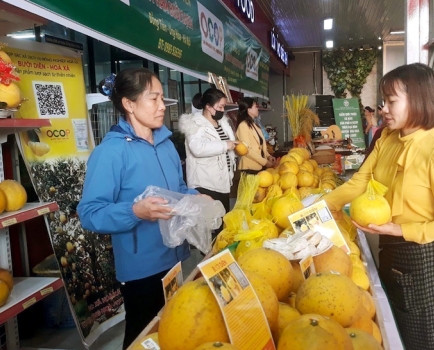The Middle East: a promising seafood export market for Vietnam
Thu, 02 Jan 2025 14:10:00 | Print | Email Share:
Seafood exports to the Middle East experienced double-digit growth in 2024, placing the region among the top two fastest-growing seafood import markets, second only to China.
 |
|
Binh Dinh Seafood Joint Stock Company is focusing on exports to the Middle East. Photo: T.H |
Top 2 fastest-growing markets
In 2024, the Middle East emerged as a promising market for Vietnam's seafood export industry, with 18% growth, reaching US$334 million in revenue during the first eleven months, representing nearly 4% of the country's total seafood export value.
By the end of 2024, Vietnam's seafood exports to the region are projected to exceed US$360 million, securing its position among the top two fastest-growing seafood import markets, trailing only China.
Among seafood products exported to the Middle East, tuna and pangasius account for the largest share, comprising 31% and 40% of exports to the region, respectively. Tuna exports witnessed a remarkable 44% growth, reaching nearly US$105 million in the first eleven months. Canned and packaged tuna exports to the region increased more than 1.5 times compared to the same period last year.
Canned tuna, particularly in oil or brine, is popular among Middle Eastern consumers due to its convenience and long shelf life. Consequently, canned and packaged products account for nearly 70% of Vietnam's tuna exports to the Middle East.
Besides tuna, pangasius is another key export product to the Middle East, achieving 13% growth, reaching over US$134 million. Pangasius fillets, cutlets, and frozen whole fish continue to dominate due to their convenience and ease of preparation, catering to consumer demand in the region.
With robust economies like Israel, Saudi Arabia, the UAE, and Qatar, the Middle East is becoming one of the most promising seafood export markets. These countries not only have high seafood consumption but also stringent standards, including Halal certification requirements, creating opportunities for Vietnamese seafood exporters.
Israel is the largest seafood importer in the region, accounting for nearly 30% of Vietnam's seafood export value to the Middle East, primarily canned tuna. This market experienced a 35% growth rate in the first eleven months of 2024. Other countries like the UAE, Saudi Arabia, Qatar, and Kuwait also recorded positive growth in seafood imports from Vietnam.
Adhering to Halal standards and export opportunities
According to businesses, a crucial factor for seafood exports to the Middle East is Halal certification. As most Middle Eastern countries are Muslim-majority, seafood products must be Halal-certified to ensure religious compliance. This requires Vietnamese exporters to strictly adhere to processing, slaughtering, and preservation procedures.
Ms. Cao Thi Kim Lan, Director of Binh Dinh Seafood Joint Stock Company, explained that due to the impact of the IUU yellow card on tuna exports to the EU in recent years, the company has diversified its markets, shifting towards Halal markets with increasing orders. The company's products meet required standards, holding both Halal and food safety certifications, and are being actively promoted in the Middle Eastern market, particularly the UAE.
Regional political instability and conflicts can also impact supply chains and seafood consumption in the Middle East. However, amid the Middle East's economic transformation, particularly its reduced reliance on oil, countries like Israel, the UAE, Saudi Arabia, and Qatar maintain high seafood demand, creating significant opportunities for Vietnam's seafood industry.
Businesses believe that the Middle East represents a promising seafood export market, with strong growth and high consumption. Products like tuna, pangasius, and other freshwater fish have considerable potential to expand their market share in the region. However, businesses must prioritize adherence to Halal standards and prepare for influencing factors such as political instability and regional conflicts.
Notably, during an official visit to the UAE, Prime Minister Pham Minh Chinh and senior UAE officials witnessed the signing of the Vietnam-UAE Comprehensive Economic Partnership Agreement (CEPA). This agreement, concluded after just over a year of negotiations, marks Vietnam's first free trade agreement with an Arab nation, ushering in a new era of strengthened and increasingly substantive relations between Vietnam and the UAE, as well as with other Arab countries.
With the Middle East's dynamic economic transformation, Vietnam's seafood industry can anticipate sustainable growth in this market in the future.
By: BUSINESS FORUM MAGAZINE
Source: https://en.diendandoanhnghiep.vn/the-middle-east-a-promising-seafood-export-market-fornbsp-vietnam-n41823.html
---------------------------------------------
Same category News :













